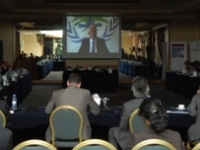Registration
Thank you!
You will receive an email confirming your registration.
IMGXYZ1396IMGZYXShortly before the announcement of the release of the four detainees, the Carnegie Middle East Center, the International Center for Transitional Justice (ICTJ), the Friedrich-Ebert-Stiftung (FES), and the Lebanese Center for Policy Studies (LCPS) hosted The Special Tribunal for Lebanon: Overview and Implications at the Rotana Gefinor Hotel. Participants included Mr. Robin Vincent (Registrar of the STL), Mr. Samir Farah (Representative of Friedrich-Ebert-Stiftung to Lebanon), Mr. Larry Johnson (Adjunct Professor of Law at Columbia Law School & former United Nations Assistant Secretary-General for Legal Affairs), Mr. Majed Fayad (Lebanese Lawyer and Member of the Council of the Beirut Bar Association), Dr. Shafik Masri (Professor of International Law at the American University of Beirut and the Lebanese American University), Ms. Marieke Wierda (Director of the Prosecution Program at the ICTJ in Beirut), and Mr. Nadim Shehadi (Associate Fellow of the Middle East Program at the Chatham House). Dr. Shafik Masri and Mr. Samir Farah both served as the moderators of the discussions which were followed by question and answer sessions. The conference was opened with brief welcoming remarks by Dr. Amr Hamzawy (Carnegie MEC), Lynn Maalouf (ICTJ) and Samir Farah (FES).
In a videotaped statement from The Hague, Robin Vincent, Registrar of the Special Tribunal for Lebanon (STL), provided a brief update on the current situation of the tribunal. Vincent emphasized that ‘outreach’ will be one of the most important aspects of the tribunal, and that people need to be updated on what is happening in The Hague. “There is a great deal in front of us, but most importantly, we want this to be a transparent tribunal, and it is important for us to let the people of Lebanon know that we are working close to them.” The European Commission has awarded 1.5 million Euros for the tribunal and the outreach effort, and the adoption of the rules and procedures and evidence for this trial have been remarkably swift compared to previous tribunals.
Mr. Johnson highlighted several key aspects that make the STL unique. This is the fifth United Nations based international criminal tribunal; however, the Lebanese tribunal is different from previous tribunals in many aspects. The STL may set a precedent for international acts of terrorism to be incorporated into international humanitarian law as crimes against humanity. This tribunal also uses a bilateral treaty, in which the Lebanese government and the United Nations have an established agreement with certain conditions that only binds these two parties to the legalities of the agreement. Finally, this is the only trial in absentia. This is mostly important because it is necessary to consider the possibility of those people who are guilty of involvement, and in absence of the trial, that might show up a few years after the tribunal closes. “Functions will have to continue even after trials stop, and they need to have a mechanism for this aspect in order to have an effective completion strategy.”
Mr. Majed Fayad was skeptical about some of the issues regarding the translations of the legal documents involved. “There might have been discrepancies between the translations of the legal terms from English to Arabic, and this has the potential to cause problems.” He added that he believes a legal mistake was committed on the part of the Lebanese authorities by the waiving of their rights of the dossier to the STL. However, he added that the best thing for both parties is to remain in cooperation with one another. This cooperation so far has been advancing the proceedings of the tribunal and it shows the commitment and respect of both sides.
Opening the second discussion, Ms. Marieke Wierda, presented her thoughts on the STL, its legal issues, and some challenges. “This tribunal is very different from the others. It has a very narrow mandate, which may present challenges. Much violence was committed both in the Lebanese Civil War and in the War of 2006, and it may be hard for people to accept that there can be justice in some cases, but not others.” She remarked that the STL’s statutes and rules are incorporating Lebanese law, and those being tried are under Lebanese law, which makes it different from previous tribunals. Agreeing with Mr. Johnson, she recognizes the unique case of the tribunal being tried in absentia, but cautioned that this is associated with high degrees of politicization. She affirms that this will be a long process, but we need to be patient throughout this process, and the public needs to be aware of the developments throughout the tribunal.
Concluding the discussions, Mr. Nadim Shehadi stated that, “One of the biggest challenges to the tribunal will be overcoming the public perceptions, which can influence the results.” However, the outreach program within this tribunal and the several regional instruments involved, such as the media, civil society, and other organizations, will help to ease this obstacle.
After the conference, the STL announced the release of the four detainees that were being held at the tribunal’s request. In response to the news of the release of the four generals, Ms. Marieke Wierda commented the following on this situation. “There might be a public perception that there is not enough evidence, but that remains to be seen. This decision only shows that there is insufficient evidence in the cases of these individuals. The overall state of the evidence is so far unclear and it will take a while before all the evidence is publicized. Putting this issue to immediate judicial scrutiny is an important step that has been taken by the tribunal.”
